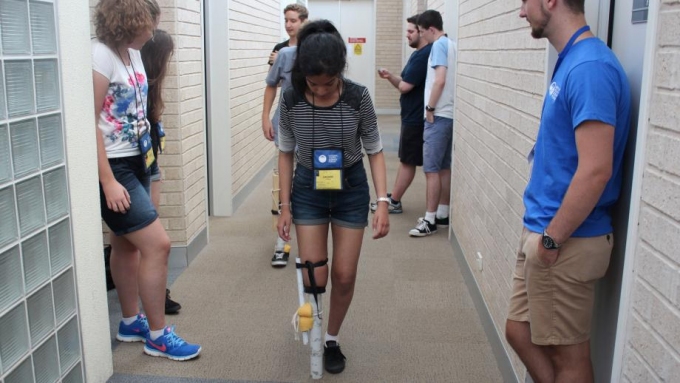Talented Year 11 and 12 science students from around Australia have taken part in a challenge to build a prosthetic leg as part of a series of national summer science programs being hosted at ANU.
“We give the students materials that you could find almost anywhere, like PVC pipe, wooden blocks and sponge,” said Jeremy Smith of the ANU College of Engineering & Computer Science, who works with ANU partner organisation Engineers Without Borders to host the challenge.
“The prosthetic leg building exercise gives students the opportunity to use their creativity in engineering,” Mr Smith said.
Year 12 student Sachini Perera from Melbourne said the challenge helped her understand the engineering process behind developing better design.
“We realised it’s not enough to just get everything together and build the leg, you have to do test runs and prototypes,” she said.
“Through the tests you work out what was a success and what was a failure, and you take information from that and use it to build a better one.”
Sachini says taking part in the program helped her decide what she wants to do when she finishes Year 12.
“I’ve been having a great time. I didn’t know what I wanted to do before I came, but now I’ve decided that I want to do biomedical engineering or medicine.”
“I figured that out through the lab visits we’ve had, we came to the engineering faculty a few days ago and that has consolidated what I was thinking,” she said.
The National Maths Summer School, the Australian Science Olympiad and the National Youth Science Forum (NYSF), have all converged on ANU as a venue for their summer programs.
Director of Science Education, Professor Barbara van Leeuwen said the programs gives students from around the country the opportunity to experience the outstanding science facilities at ANU.
“These are some of the best and brightest young students in Australia, so it’s great to be able to give them a feel for university life and meet our expert researchers,” Professor van Leeuwen said.
“The students get to stay on campus and experience what it’s like to study at ANU.”
The program runs until 30 January 2015 with students attending a range of educational, formal, personal development, and social activities.
This article was originally published at ANU News.

